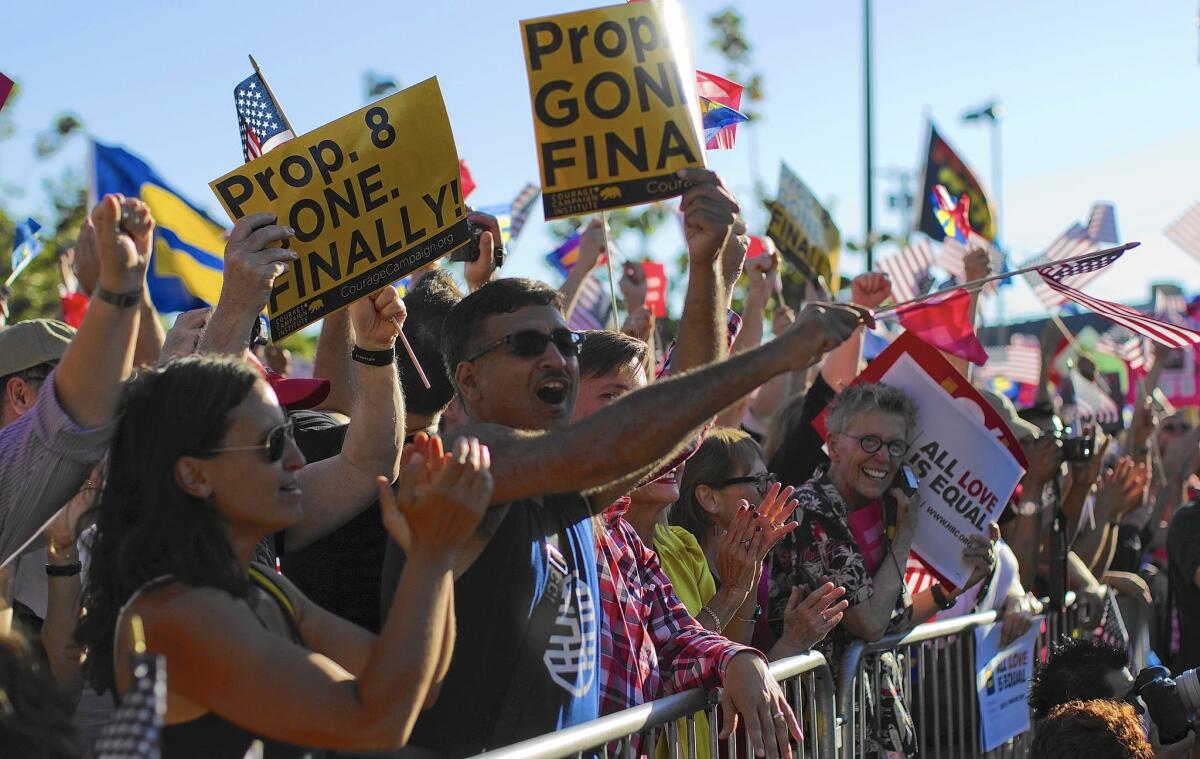Mormon Church’s shift on gay rights follows series of defeats in California

- Share via
The pledge Tuesday by the Mormon Church to oppose housing and job discrimination against gays follows years of piercing church losses in California over gay rights, including one last week.
The church opposed a new rule to bar California judges from becoming leaders in the Boy Scouts of America because the organization prohibits gays from being Scout leaders.
In letter after letter to the California Supreme Court, Mormons complained the policy would interfere with Mormon judges’ freedom of religion. The church sponsors Boy Scout troops and members are assigned leadership positions as part of their religious duties.
“The scouting program is an integral part of the church’s training of young people,” wrote Susan H. McCollum of Santa Barbara. “There are many people in each ward [congregation] who, as part of their required service in the church, must register as a member of the Boy Scouts of America.”
San Bernardino Superior Court Judge Steve Mapes wrote: “Whether or not it is intended, the effect of this modification would serve to disenfranchise LDS members of the Bar and Bench from Judicial Service.”
But the California Supreme Court voted unanimously last week to adopt the new rule anyway.
That fight over judges followed a drawn-out battle over gay marriage in California. The Church of Jesus Christ of Latter-day Saints was a leader in advocating for passage of Proposition 8, the 2008 ballot measure that banned same-sex marriage in the state until courts overruled it, and Mormons were encouraged to support and contribute to the campaign.
Many of those supporters said they suffered threats on their lives, property vandalism, boycotts of their business and even lost jobs.
The church was caught off guard by the fury Proposition 8 provoked.
“Ever since then, they have tried to be clear that with the exception of same-sex marriage, they support the full range of civil rights for all citizens,” said Patrick Mason, director of the Mormon studies program at Claremont Graduate University.
Some gay rights leaders were not convinced of the church’s sincerity, but Kate Kendell, head of the National Center for Lesbian Rights, found the statements history-making.
“The Mormon Church is in a different place than it was during Prop. 8,” Kendell said. “There is an ongoing campaign to make a very strong course correction from where they were.”
Kendell, who grew up Mormon in Utah, was there Tuesday giving a speech at a ribbon cutting for a gay and lesbian resource center.
“The church has probably been influenced by Mormons living in places like Southern California, who want the church — particularly after the bruising experience of Prop. 8 — to actually live the values of kindness, acceptance and empathy that they believe are at the heart of the faith,” Kendell said.
About 768,000 Mormons lived in California as of 2013. The largest Mormon temples in California are in West Los Angeles and Oakland.
Still, the divisiveness of the Proposition 8 battle lingers. Andrew Pugno, who served as a lawyer for ProtectMarriage, which supported the measure, said he thought the church’s move “speaks to the need to better address religious freedoms in California.”
His group has sued state officials for requiring the campaign to disclose the addresses and employers of those who contributed to the proposition, many of whom declared under oath that they had received death threats.
Two Mormon temples and a Catholic Knights of Columbus building received envelopes containing a white powdery substance, according to the lawsuit.
Fred Karger, founder of Californians Against Hate, which organized boycotts of donors who supported Proposition 8, said he worried the church’s focus on religious freedom might mean they want a license to discriminate, despite their words of conciliation. Still, he called Tuesday “a great day.”
“When they speak like they did today, their 6.5 million members in the U.S. will change their minds accordingly, so that is huge and that is going to impact a lot of lives,” he said.
Twitter: @mauradolan
Twitter: @LATseema
Times staff writer Jeff Gottlieb contributed to this report.
More to Read
Sign up for Essential California
The most important California stories and recommendations in your inbox every morning.
You may occasionally receive promotional content from the Los Angeles Times.












